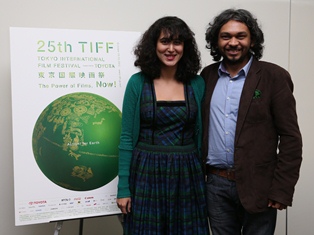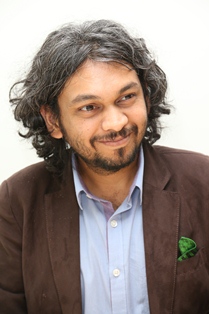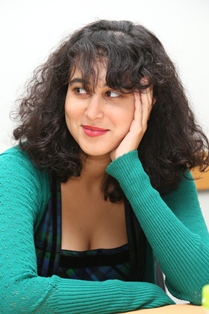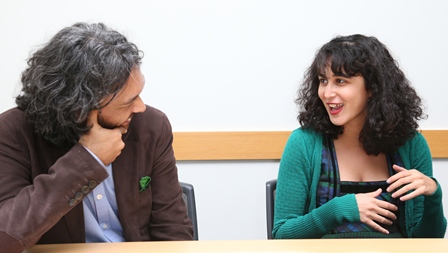Interview with Director Anand Gandhi and Actress Aida El Kashef (“Ship of Theseus”)

When talking about the themes and philosophies that “Ship of Theseus” probes and illustrates, director Anand Gandhi’s infectious exuberance made for a great conversation. Gandhi’s film deals with some mighty ethical conundrums, but not dryly. It’s as passionate as he is. His leading actress, Aida El Kashef, joined in on the fun
— The “Ship of Theseus’ theme is based on this logical conundrum – when you replace all the old parts on Theseus’ ship with new parts, is it still the same? Apart from the theoretical concern what were the things that inspired you to develop these particular stories to demonstrate these ideas?
Anand Gandhi: All the concerns were largely philosophical. Probably it would be impossible to isolate the philosophical paradigms that stand at the root of all of the narrative pieces. There were lots and lots of questions that I had. And it seemed the possibility to put these questions together in some sort of a metaphor, in some sort of a narrative metaphor – that’s where the stories evolved. Lots of emotional exchanges from my own life – from things I observed in my friends’ lives and my family’s life and other people whom I’d observed closely – where I felt that their lives and the situations they found themselves in or I found myself in are good manifestations and metaphors for the philosophical concerns I had. So, for example, the stockbroker’s story – It occurred to me that the news that kidneys being stolen and live organs being stolen from people every now and then – being in India – it’s part of the news routine, that a scandal like that occurs at one place or another. What concerned me really, was the recipient’s point of view. I mean, there’s filmmaking that documents issues of concern, which is a very important kind of filmmaking – that these issues are discussed very actively and aggressively and openly. My concerns lie somewhere else, as there was an understanding of the place where it took place – that we find ourselves in this world where a kidney patient somewhere in Sweden is lying on a bed there. With the sheer lack of the number of people in the community, the availability for a live organ is much lesser. So, you’re on a list and you’re on your death bed and you don’t know if you’re going to make it. And then you hear of this – there’s another part of the world, with this huge population living below the poverty line, willing to sell their live organs ’cause they’ll never be able to make the kind of money for offering their live organ. Both are going to survive. They’re going to make it.
And then one goes and buys this kidney, because there’s this confrontation and the fear of death and there’s this false logic at play which does make sense at point – which makes sense that OK, you’re going to pay a certain amount money that the person living below the poverty line is never is going to be able to make in his entire life of labor. 20,000, 30,000 US dollars is what he’ll end up making in a lifetime of labor. It will take care of his family. It will take care of his children’s education. That kind of money will take care of a lot of things. And in return he’ll give you a kidney, which will help you survive. Now, at some level this logic seems falsely justifiable on paper. For me the observation of this situation is very important – that we find ourselves in a place right now in the world that we’ve built, where a system exists where this makes a sort of logical sense. That this being an extremely black and white reality – that you can not exploit another human being’s lack of resources, another human being’s lack of advantage or disadvantage – to your advantage. You can insist its ethically wrong so that it’s in a gray space and that is a reflection of how we are waking up to the failure of economic systems around the world. It’s a reflection for me of the Occupy movement. It’s an echo of all the movements around the world right now, which are waking up to understanding that there are systems that have failed us – economic and political systems. So for me, the stories are extremely closely, intricately woven with these philosophical paradigms. Each one of them.

— I was thinking though, in your talking about economic systems and things that have developed around this modern technology of organ transplants – it’s new to our world – do you think that with this change in technology, with this change in rebuilding the human body, the human boat, is it changing humanity fundamentally?
Gandhi: It is definitely. It is definitely. I wouldn’t have the presumption to attach any kind of value to it. Whether it is good or bad, it’s too early to say. Not good or bad, but whether it is sustainable or detrimental to the human species in a collective way. It’s too early to understand that. Whether this speedy change in our scientific, social, political, economic technologies and our biological technologies – which takes a good 30, 40 thousand years to change. One mutation crosses over at least a thousand generations before it’s allow to be or it’s crossed out. Whereas external technology that is created by human beings, but outside of their biology changes and evolves at a speed of accelerated danger to us. It changes so fast the dichotomy increases more and more and more. When we find ourselves at a point when for every stimulus in the environment we have a have a dual paradoxical dichotomic response. And the heart and the mind conflict. The traditional heart and mind conflict is essentially nothing but the nature versus nurture conflict – the traditional literature is now rephrased in the way I look at the world as biological technology versus human technology – at least our external memory technology technological conflict. So our biological technology has one response to the stimulus and our intellectual technology has another response to the stimulus and were constantly living in this balance and this dichotomy. Our body tells us that it’s fun to have sugar, so we have lots of sugar. But it’s bad for our body and our body does not know that as our body is still informed by technology that is 30 thousand years obsolete – because simple carbohydrates are desired by human beings 30 thousand years ago and were very desirable. Holding on to calories was very desirable. Jealousy was a relevant emotion 30 thousand years ago, because mating partners were rare and to hold onto mating partners was a very important response. So on and so forth, we have all these responses in our body, which are emotions, – which are extremely obsolete and are detrimental to our survival and hence, technology is very important. Hence it’s very important to suppress the beast, to repress this beast with relevant information, modern knowledge and modern understanding – and that’s what civilizations do. That’s what civilized cultures help to do. They help us replace this beast, but at the same time, it’s a dual edged sword. We are also finding ourselves in a fast-changing world where we don’t know how to assimilate all this information, all this data and all this technology that we are creating and producing. So, it’s an extremely important change and we need to really – I think my role as an artist and that’s what we keep talking about, that role as artists and being – at this point, is to be able to assimilate all this data that time is throwing at us, that knowledge is throwing at us and to make sense of it. And that’s what I think my film is trying to do – to make sense out of…I mean, we’re a few months into having discovered the Higgs boson particle for example. I don’t know what it means. I’ve not yet met any… and I have many friends who are really in tune with the way the world is right now and have a very, very good sense of their environment and themselves and nobody really understands what this discovery means to them.
Aida El Kashef: I read about it but it’s too scientific. And then the moment it turns into actual things or technology, then, you know… the technology is there because of this…

Gandhi: And still, we’re living in a time when – I was just talking to my brother and he told me that the laptop, for example, is – to make one laptop work, including the hardware and the software, there’s an estimate of about 2 million people, or something like that, who will put work into the working of one laptop. So, it’s immense the kind of collective technologies that we’re using and the way they’re changing us and the way they’re changing our reality. The total amount of people on the planet… from the biological technology we are using which is from about 30, 40 thousand years ago… it’s still the same genetic code we’re using. The total amount of people on the planet was about 20 thousand people. That’s the total number of people our forefathers ever came across in their lives or are our facebook friends. It’s really changing so fast and I think it’s… I find my role as a filmmaker, as an artist, relevant in that position, where I can possibly stand, observe, assimilate all this data, make sense of it and share. That’s probably my job, I guess.
— We’re talking about the technology of organ transplants that’s changing our bodies. Then you talk about the exterior technologies and these show up in each sequence. In the sequence with Maitreya, there’s the beautiful scene where he walks through the wind farm… and it’s outside of him even though it obviously affects his life, but Aida’s character is intimately involved with technology, that helps her experience the world. And in the final sequence, there’s probably a little less technology, but there’s one scene where you have this guy on a bicycle, in water – it’s on a television screen – and to me it was like a bicycle that’s been reconfigured to do some other activity, like go through water. So, obviously, you’re obsessed with technology.
Gandhi: I’m so happy you noticed that. Wow, it’s like you’re the first person to notice that. I’ll tell you about it.
— The first? Well tell me about it.
Gandhi: It’s the invention of this genius guy who lives in this extremely remote neighborhood in India – In Bihar – This old man, he’s never been to school. He does not know the alphabet. He’s not literate and he invents. He’s invented this bicycle that cycles on land… the moment it goes into a body of water, he just like flips it, he just like pushes a few levers and goes like… ftt, ftt, ftt, and then he pedals it all across water… and he goes across and it’s like a zero-budget bicycle. It’s an amphibious bicycle, runs on land, runs on water and it normally probably costs, like, fifteen or twenty dollars. This is like… it’s so inspiring what these guys are doing and there’s this movement in India called the National Innovation Foundation. It’s a great movement. That’s something that I find similar between a lot of eastern cultures – India, Japan – traditionally there is no notion of patenting. Traditionally, there is no notion of owning information, of owning knowledge and of owning a way of making something that belongs only to you and you are the one and your generation is the ones that make money off it. That is a way, historically a very non-American. And now these guys are beginning to kind of have to accept that this is the world were living in. Again, it’s a reflection of that, the way a notion is shared. I’m glad you noticed that. That’s one place where I kind of hinted that and how the grandmother is interested in that and they are not – the younger generation – because they don’t know. They represent another part of the world.
— In regard to your character, Aida, who uses this technology to create your art, I think that story brings up the idea that the technology helps you create the art, but it’s not what creates the art. It’s your character’s spirit, or soul.
El Kashef: For me, if I was not blind, there’s still a camera. So, a camera is a technology, that everyone has now. For example, everyone has a Cannon. And they all bring out good pictures, like even if you’re not a good photographer. But eventually there’s one or two or three photographers that will stand out even though they’re using the same camera, because it’s art. That’s where art comes from and that’s when it really separates from the technology, which is the camera, right? So, for me it was the same as if I were not blind, because in the end it’s just more gadgets added to the camera itself. So it would have been used the same way. You know what I mean? Like there’s nothing special about them in the sense of, like yes, they’re gadgets that are helping me to realize the light because I can’t see the meter in the camera. But they’re not doing anything other than that. – and so a blind photographer can use them and make good pictures. Another one wouldn’t because it’s still the same concept as just the camera.
Gandhi: That’s absolutely true. Yeah. That’s bang on. Instead of using biological technology, she’s using scientific technology created by people. But it’s essentially doing the same job, the same job that eyes do. We are all equipped with relatively similar technology. We’re all using eyes. We’re using our perception, but we perceive differently. Similarly, a few blind photographers using the same technology would each have their own expression and own perception and their own way of reflecting on that. The interface is not important at the end of the day. The interface can be biological. It could be non-biological. That’s what we’re all looking for.
El Kashef: ‘Cause, also the idea of photography is not… yes, it comes from you… biological. The thing is, you look and you see and you create memories. And the camera does that for you, so that’s the technological part of it. And so, the gadgets that help me realize where the f-stop, for example, or the color correction or whatever, it’s doing the same, instead of me looking and seeing the f-stop on the camera, it’s telling me what it is. So I mean…
— Who took the photographs. Did you take them?
El Kashef: Some of them…
Gandhi: A lot of them were taken by Shriti Banerjee. She’s our costume designer. And she’s also a very talented photographer.
El Kashef: … the pictures with the monkeys. But a lot of pictures are Shriti’s. I don’t know. I actually didn’t see my photos. Anyway, there are a few pictures that we used from the scenes themselves while I was taking pictures. Then they were also taken blindly.
Gandhi: There were a lot of blind pictures that she took while she was actually “blind.” In her act, she would have to blind herself, even if she’s seeing she could not develop that technique for a period of rehearsals, I think. Even if she’s able to see she would feel blind from inside and…
El Kashef: We had to… it’s as if you were looking inside your eye… you know, when your really concentrate a lot and then your sight gets kind of lost inside. It’s a very biological thing. It’s not a trick. It happens to everyone if you’re… you know when you’re really concentrating on something and then you…
Gandhi: Your vision improves, but you’re blinding yourself out somehow…
El Kashef: When everything is really out of focus because your eye’s really focused on something and then, you know what I mean?
— I think it’s like the idea of the persistence of memory. For example, when you hear a tone, there’s a certain point when you stop hearing it if it’s constant. If it changes, you go, oh, something’s changed. So, staring, if nothing changes…
Gandhi: …your mind becomes tired of it so gives up on focusing sometimes.
El Kashef: So that’s basically what we were using it for. Preparing… actually when I came… it was my second time in the movie to start shooting and… Anand kept me three days blindfolded.
— Oh really! Wow!
Gandhi: She didn’t see her boyfriend like the way she didn’t see him in the story for a while. So she didn’t see the actor and she… and after like four days of rehearsals and then they… I hoped that they would develop some kind of chemistry. They didn’t. She refused to have anything towards Vinay. But for four days while they rehearsed she didn’t see him. She didn’t know the way he looked. And after 4 days we took the blindfold off and she saw him for the first time.
— Aida, you’re also a filmmaker, photographer, activist…
El Kashef: Not photographer. I’m a filmmaker and… I am a filmmaker, not also… I’m not an actor.
— Yes! You are a filmmaker… and you’re also an actress.
El Kashef: Sometimes.
Gandhi: She’s only a revolutionary right now. She’s only a part-time filmmaker.

— My question is, in your work, personally, as an artist, how does that inform your character in the film? Did you bring in any of your personal philosophies into the character of Alia?
El Kashef: I’m not sure if it happened consciously, but I think it must have, because we also altered the script a bit because it was not meant for an Egyptian character. So like, for example, the way the character was dressed is actually how I’m dressed. The names that we chose… like everything that we chose around the character from the outside, it comes from me or things that I like in Egypt, or whatever. There was no conscious decision because also for me, it was a very new experience. First of all, India – like that’s the longest time I’ve stayed outside of Egypt. And also acting, which was really weird. And acting in English. I hope that something from me came out in the character, but there were no decisions taken consciously upon it.
Gandhi: I think it did come out. Her personality gave a very, very important color to the character, I think, when I look at the film. We’ve been editing it for two years. She hasn’t seen her own role, so I remember every moment, every line. I spent so much time on the material and I think… the script largely is the same, that was meant to be, but the way it was interpreted, the way each line came out was something that came from way inside of Aida. I saw it for the first time in Hanover in Germany when she had come with a short film there… and she was eighteen at that time. And when she spoke, people listened. She had this extremely strong aura about her. And that I think comes across a lot in her character, this very strong sense of identity, this very strong center that she has. That was given into the character. I mean, at a text level the character I would imagine was a bit softer. She brought in the edge, I think.
El Kashef: And also the way I was talking, like I talk naturally. We didn’t do any clear characterization other than, like, playing with… rehearsing the idea of being blind we didn’t even imitate blind people. We met a lot of blind people of different ages. We did not imitate how they moved. We just found out, like when I’m moving and I can’t see, I’m blind, how does that come out and then I imitate myself. So I think it was a very natural way of acting. Like there were no certain characteristics and also there was a space… like of course the dialogue was very precise. It was written before and Anand was very precise about every sentence and it was very hard for me because… his English is pretty hard – the vocab he chooses… and English is not my natural language. So then I really had to, like really, fumble a lot. It’s true. It’s not meant that the character fumbles, but I fumbled.
Gandhi: It was meant to be fumbled.
El Kashef: … but not to that extent.
Gandhi: It was! I think what was added – like one scene where her boyfriend is describing the photograph to her and Faraz speaks English the way the English speak English because he’s spent most of his life in London, so, it’s more justified in the way they talk. When he’s describing the photograph to her, he sometimes would use words which she didn’t understand because it’s not her first language. So he at one point says, “there’s a gabled roof” and she says, “gabled roof?” and he says “like a sloped roof.”
El Kashef: I was doing that in reality.
— Particularly the sequence with Maitraya, who’s very spiritual and trying to keep a correct ethical life.. and you also bring in Mukhktiyar Ali singing in that one scene.
Gandhi: In the stockbroker story?
— Yeah. So, there’s kind of a spiritual element that happens with this story of wild modern technology. Did you yourself have a spiritual upbringing or have some sort of spiritual philosophy?
Gandhi: I’ve been raised in a secular middle-class Indian unreligious family where religion has been quietly and politely replaced with modern spirituality. And classical Indian religions are more spiritual than dogmatic. Buddhism and Jainism are more inclined toward mono-ism and non-dualism than they are toward any kind of theism. So, I’ve been raised in that kind of a culture, but personally I am not sure if I can identify myself as spiritual because I’m convinced about our non-transcendental selves. I don’t have a relationship with anything that’s theistic or that’s remotely of a transcendental concept. In that sense I’m not, but, yeah, I’m extremely in awe of the mystery. And I’m extremely in awe of the last few hundred million years we have evolved and the rich complexity that we have arrived at in terms of who we are and where we come from and what we have built around us. I’m extremely, extremely in awe that magic and that engineering… that biological engineering, that human engineering. I’m extremely in awe of that miracle.
Interview by Nicholas Vroman



















